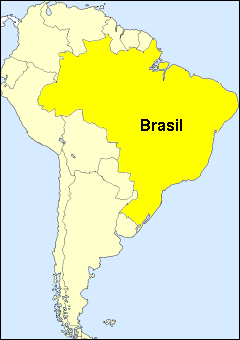3. The Portuguese language throughout the world
It has been estimated that between 190 and 230 million people speak
Portuguese throughout the world. Portuguese is the eighth most spoken
language on the planet, and after English and Spanish (or Castilian), the
third most spoken language of the West.
Portuguese is the official language of the following eight
countries spread across four continents:
- Angola (10.9 million inhabitants)
- Brazil (185 million)
- Cape Verde (415,000)
- East Timor (800,000)
- Guinea-Bissau (1.4 million)
- Mozambique (18.8 million)
- Portugal (10.5 million)
- Sao Tome and Principe (182,000)

|
|

|
| Europe |
|
Asia |

|
|

|
| South America |
|
Africa |
Since Portugal joined the organisation in 1986, Portuguese has been
one of the official languages of the European Union, or EU (which was
formerly known as the European Economic Community, or
EEC). Furthermore, in the countries that form a part of Mercosul,
although with the exception of Brazil where it is the official
language, Portuguese is taught as a foreign language in accordance
with the agreement that was signed by the member nations to create the
Common Market of Southern Latin America.
In 1996, the Community of
Portuguese-speaking Countries (with the acronym of CPLP in
Portuguese) was formed with the aim of increasing co-operation and
cultural interchange between members, as well as standardising and
diffusing the Portuguese language itself.
Index
- 3.1. The Lusophone world
- 3.2. Portuguese in Europe
- 3.2.a. Portugal
- 3.2.b. Galician
- 3.3. Portuguese in the Americas
- 3.3.a. The History of the language in Brazil
- 3.3.b. Brazilian dialectal zones
- 3.4. Portuguese in Africa
- 3.4.a. Angola
- 3.4.b. Cape Verde
- 3.4.c. Guinea-Bissau
- 3.4.d. Mozambique
- 3.4.e. Sao Tome and Principe
- 3.4.f. Other regions of Africa
- 3.5. Portuguese in Asia
- 3.5.a. East Timor
- 3.5.b. Other regions of Asia
|



